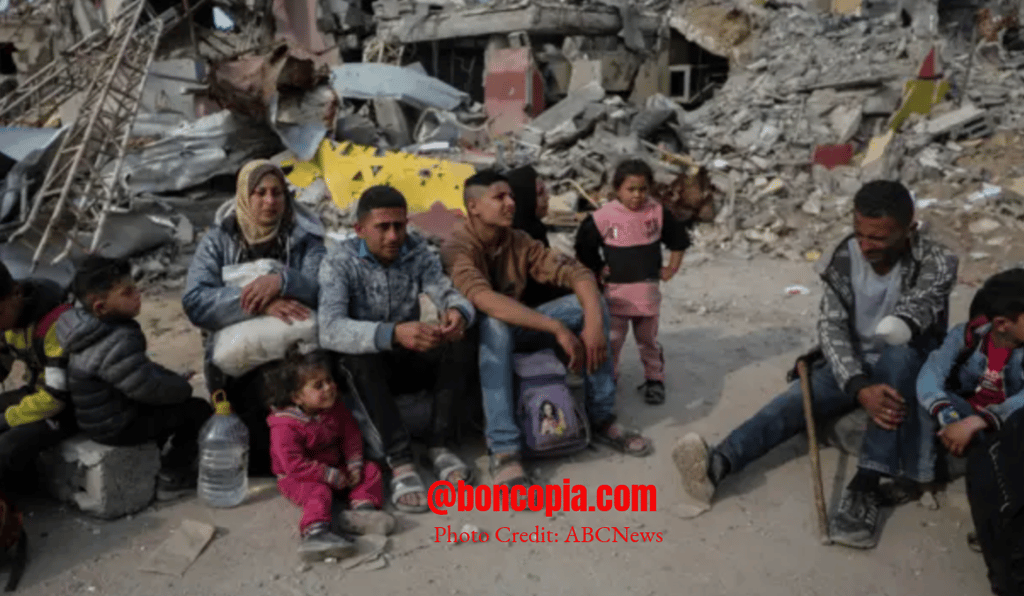Trump's Gaza-to-Libya Plan: A Geopolitical Powder Keg?
5/19/20253 min read


Trump's Gaza-to-Libya Plan: A Geopolitical Powder Keg?
Intro: A Controversial Proposal
NBC News dropped a bombshell: the Trump administration is reportedly developing a plan to relocate up to 1 million Palestinians from Gaza to Libya. This proposal, framed as a solution to the Israel-Palestine conflict, has triggered condemnation from Arab nations, humanitarian organizations, and even U.S. allies. Is this a bold, pragmatic reset, or a reckless escalation destined to destabilize an already volatile region? Let's dive into the details and examine the potential global fallout.
The Plan: Mass Relocation Under Scrutiny
The core of the plan involves moving a significant portion of Gaza's population – potentially forcibly – to Libya, a nation struggling with instability since its 2011 civil war. While specifics are scarce, sources suggest the proposal includes offering financial incentives to Libya to accept the refugees, along with U.S. support for infrastructure development. The Trump administration reportedly views this as a means to "stabilize" Gaza by reducing its population, thereby aligning with Israel's security objectives.
This plan follows Trump's recent Middle East trip, where, according to BBC News, he secured a staggering $1.2 trillion in economic deals with Qatar, Saudi Arabia, and the UAE. This has fueled speculation that these deals might include tacit support for the relocation, although no country has publicly voiced its endorsement.
Global Backlash: A Chorus of Condemnation
The reaction to the reported plan has been immediate and overwhelmingly negative. Egypt, Jordan, and the Palestinian Authority have vehemently condemned the proposal, labeling it "ethnic cleansing" and warning that it violates international law. The UN High Commissioner for Refugees has deemed it "unfeasible," citing Libya's fragile government and the documented human rights abuses against migrants within the country. Social media platforms have also exploded with criticism, with users like @GlobalWatchdog on X describing it as "a humanitarian disaster in waiting."
Even close U.S. allies like the UK and Canada have expressed their concerns. During a recent White House visit, Canadian PM Mark Carney reportedly urged "caution." Furthermore, Libya's interim government has denied any agreement to the plan, as reported by Reuters, further casting doubt on its practicality and viability.
Geopolitical Stakes: A Region on the Brink?
This proposal has the potential to drastically reshape the Middle East landscape:
Israel-Palestine Tensions: Relocating Palestinians could embolden hardliners within Israel, potentially leading to an escalation of violence in Gaza and the West Bank.
Arab World Reaction: Key U.S. partners like Saudi Arabia and Qatar will face immense domestic pressure to publicly oppose the plan, which could strain their relationships with the United States.
U.S. Credibility: Trump's unilateral approach, which seemingly bypasses established UN frameworks, could further isolate the U.S. diplomatically, as suggested by Bloomberg Economics.
This plan appears to align with Trump's broader strategy of using economic leverage, particularly his tariff policies, to exert pressure on global actors. By linking economic deals to compliance, he may be attempting to compel Arab states to support the relocation, although significant resistance is anticipated.
Skeptical Lens: Is It Feasible, or Just Rhetoric?
Critics argue that the plan is more symbolic than realistic. Libya's fragmented government lacks the capacity to absorb a million people, and the funding mechanisms remain unclear. Posts on X from users like @GeoAnalyst suggest that it is a "distraction" from the domestic fallout of Trump's tariff policies. Yet, Trump's history of bold and unconventional moves – such as the Abraham Accords – lends credence to the possibility that he is willing to pursue highly controversial policies, regardless of the potential consequences.
What's Next? A Waiting Game
The Trump administration has yet to officially confirm the existence of this plan. However, mounting pressure from allies and NGOs may force them to clarify their position. If the administration moves forward, it is likely to face legal challenges under international refugee law. For the time being, it remains a geopolitical flashpoint, and it will test the limits of Trump's ability to reshape the Middle East according to his vision.
Conclusion: A Risky Bet with Far-Reaching Consequences
Trump's rumored Gaza-to-Libya plan represents a high-stakes gamble that could either redefine the Israel-Palestine conflict or trigger a major humanitarian crisis. While it might align with his signature deal-making style, the global backlash underscores the significant risks involved. As the world watches with bated breath, the fate of this plan will undoubtedly have a profound impact on U.S. foreign policy and regional stability for years to come.
Thought Questions:
Is relocating Palestinians to Libya a viable solution to the conflict, or does it inevitably lead to a humanitarian disaster?
How will Arab states navigate the delicate balance between domestic pressure and the economic incentives offered by the United States?
Could this plan ultimately damage Trump's global standing, even among staunch allies?
hello@boncopia.com
+13286036419
© 2025. All rights reserved.